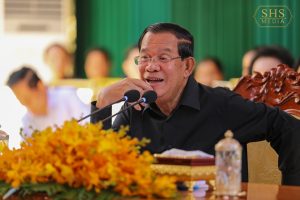I cannot profess to have known Mech Dara – the award-winning Cambodian freelance journalist arrested on Monday – as much as my colleagues, nor have I ever worked alongside him. But his courage and wit were evident from afar. Nor is it difficult to work out why Dara was targeted now. Phnom Penh wanted revenge for the United States sanctioning Ly Yong Phat, a key ally and advisor to the ruling Hun family, a few weeks ago for the trafficking of people forced to work in scam centers connected to his conglomerates. Dara was awarded the U.S. State Department’s human trafficking Hero Award last year, and his work has uncovered the immense scale of Cambodia’s scamming industry, thought to be worth around half of the formal economy.
In one way, his arrest is a challenge to Washington. The United States no longer cares about the liberty or human rights of the Cambodian people, and its concerns about the Ream Naval Base wax and wane. But Washington is getting steely-eyed about Southeast Asia’s scam industries because Americans are increasingly their victims. After all, Washington regards the human rights of Cambodians as little concern to most U.S. citizens, yet Cambodian-based scammers stealing millions of dollars from U.S. citizens is a different matter, one that touches on national security.
Put geopolitics aside, though. Mech Dara’s arrest is an affront to the Cambodian people. How does it feel that one of your bravest citizens has been arrested and faces many years in prison because your government is using him in a tit-for-tat against another country in order to defend criminals who have turned your country into a “scam state”?
Lost amongst this was the news also this week of the arrest of Nuon Toeun, a Cambodian domestic worker in Malaysia. She was rounded up by the Malaysian authorities, handed over to the Cambodian embassy, spirited back to Phnom Penh, and sent straight to the notorious Prey Sar prison. Her apparent crime? She called Hun Sen a “despicable guy.” To be more accurate, she said as much and foresaw the consequences. Responding to a social media post that warned it was sinful to criticize the Dear Leader, she wrote: “If I have sinned because I [have cursed] this despicable guy, I am happy to accept the sin because he has mistreated my people so badly…I am not a politician, but I am a political observer and expressing rage on behalf of the people living inside Cambodia.”
Naturally, Toeun’s arrest has received little media attention – only Radio Free Asia had covered it at the time of writing – while most international newspapers have covered Dara’s detention. Needs must, after all. Editors of international newspapers know the average American or Brit is more likely to care if you run the headline like the BBC’s “Award-winning journalist who exposed cyberscams is arrested.” But Toeun’s arrest is just as galling, and she warrants as much praise for her courage to speak honestly. It is also almost certainly true that she did not break any Malaysian law, yet Southeast Asia’s repressors are so tight that they don’t mind infringing their own laws to assist a neighbor. The region doesn’t like federalizing except when it comes to censorship.
It hasn’t yet been stated what exactly about her calling Hun Sen a “despicable guy” Phnom Penh had a problem with. Did Cambodia’s authorities believe it to be untrue or were they merely aggrieved by Toeun’s temerity? A prison spokesperson was quoted as saying that she was charged with “inciting to commit acts that cause serious disturbance to social security and incite discrimination,” yet one can incite a crowd with the truth or a lie. Indeed, the truth is often more inciting.
Read between the lines of what the Cambodian authorities say and you will see their own insecurities. If the Cambodian people didn’t regard Hun Sen as despicable, why might they cause a disturbance upon hearing it said? If you have to go through the trouble of having another country detain a maid for saying Hun Sen is despicable, clearly the Cambodian government reckons that a good number of its citizens share this opinion. (So many, in fact, that they could “cause serious disturbance to social security.”)
And why not share this opinion? Because of the reporting of brave journalists like Mech Dara, we know that the Hun family has turned Cambodia into a “scam state,” a country even denigrated by Chinese blockbuster films. What’s Cambodia’s biggest industry? Scamming, which is now thought to be worth around half of formal GDP. The police have been revealed as too incompetent or corrupt to do anything meaningful about it. The political royalty is so tightly snuggled under the sheets with the scam tycoons that it’s too late to kick them out of bed.
Is this the image that Cambodians want for their country? A country mocked by films approved by Beijing’s censors? A country where the government will imprison a courageous citizen just to spite the U.S. Treasury Department? A country where you cannot speak your opinion but where it’s very profitable to speak lies to con someone? Does the average Cambodian take pride in the fact that their country’s main economic activity is now swindling money from the pockets of vulnerable people?

































